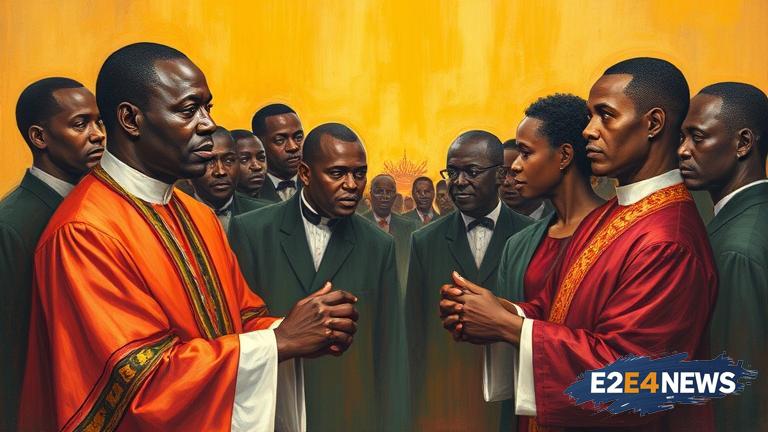In a recent statement, the National Council of Churches in Zambia (NCOZANA) has cautioned clergy against participating in partisan politics. This move is aimed at promoting a neutral and impartial stance among religious leaders, allowing them to focus on their spiritual duties without being swayed by political affiliations. NCOZANA’s directive is a response to the growing trend of clergy involvement in politics, which has raised concerns about the blurring of lines between church and state. The council’s leadership has emphasized that clergy should prioritize their role as spiritual guides and avoid taking sides in political matters. By doing so, they can maintain their credibility and integrity, as well as uphold the principles of their faith. The move has been welcomed by many, who believe that it will help to promote a more harmonious and respectful political environment. However, some have expressed concerns that the directive may be seen as an attempt to stifle the voices of clergy who wish to engage in political discourse. NCOZANA has clarified that its intention is not to restrict the freedom of speech of clergy, but rather to encourage them to exercise their right to participate in politics in a responsible and respectful manner. The council has also emphasized the importance of clergy engaging in issues of social justice and advocacy, as long as they do so in a non-partisan and inclusive way. This approach is seen as a way to promote the common good and uphold the values of compassion, equality, and fairness. In Zambia, the relationship between church and state has been a subject of debate, with some arguing that the church should play a more active role in politics, while others believe that it should maintain a neutral stance. NCOZANA’s directive is seen as a way to navigate this complex issue and promote a more nuanced understanding of the role of clergy in politics. The council’s leadership has also emphasized the importance of promoting interfaith dialogue and cooperation, as a way to build bridges and foster greater understanding between different religious communities. By doing so, they hope to create a more inclusive and respectful environment, where people of different faiths can come together to promote the common good. The move has been seen as a positive step towards promoting greater cohesion and unity in Zambia, where the church plays a significant role in shaping public opinion and influencing social norms. However, some have raised concerns that the directive may be difficult to implement, given the complex and often fraught nature of politics in Zambia. Despite these challenges, NCOZANA remains committed to promoting a more responsible and respectful approach to politics, one that prioritizes the values of compassion, justice, and equality. The council’s leadership has also emphasized the importance of promoting transparency and accountability in politics, as a way to build trust and confidence in the electoral process. By doing so, they hope to create a more stable and secure environment, where people can feel confident in the integrity of the political system. In conclusion, NCOZANA’s directive is a significant step towards promoting a more nuanced and responsible approach to politics in Zambia. By encouraging clergy to refrain from partisan politics, the council hopes to promote a more harmonious and respectful environment, where people of different faiths can come together to promote the common good.
